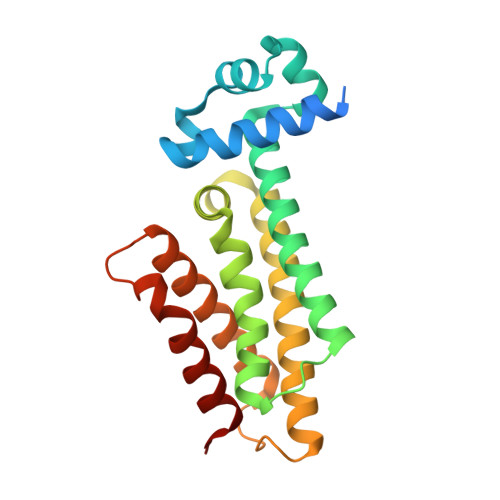Ligand Efficiency Driven Design of New Inhibitors of Mycobacterium tuberculosis Transcriptional Repressor EthR Using Fragment Growing, Merging, and Linking Approaches.
Villemagne, B., Flipo, M., Blondiaux, N., Crauste, C., Malaquin, S., Leroux, F., Piveteau, C., Villeret, V., Brodin, P., Villoutreix, B.O., Sperandio, O., Soror, S.H., Wohlkonig, A., Wintjens, R., Deprez, B., Baulard, A.R., Willand, N.(2014) J Med Chem 57: 4876-4888
- PubMed: 24818704
- DOI: https://doi.org/10.1021/jm500422b
- Primary Citation of Related Structures:
4M3B, 4M3D, 4M3E, 4M3F, 4M3G - PubMed Abstract:
Tuberculosis remains a major cause of mortality and morbidity, killing each year more than one million people. Although the combined use of first line antibiotics (isoniazid, rifampicin, pyrazinamide, and ethambutol) is efficient to treat most patients, the rapid emergence of multidrug resistant strains of Mycobacterium tuberculosis stresses the need for alternative therapies. Mycobacterial transcriptional repressor EthR is a key player in the control of second-line drugs bioactivation such as ethionamide and has been shown to impair the sensitivity of the human pathogen Mycobacterium tuberculosis to this antibiotic. As a way to identify new potent ligands of this protein, we have developed fragment-based approaches. In the current study, we combined surface plasmon resonance assay, X-ray crystallography, and ligand efficiency driven design for the rapid discovery and optimization of new chemotypes of EthR ligands starting from a fragment. The design, synthesis, and in vitro and ex vivo activities of these compounds will be discussed.
Organizational Affiliation:
Université Lille Nord de France , F-59044 Lille, France.















